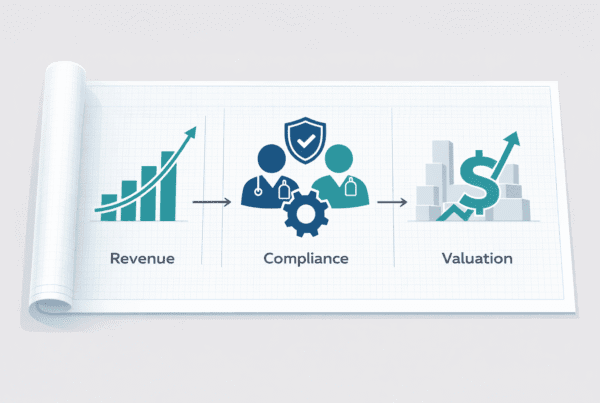You have built a successful Urgent Care practice in Tennessee. Now, you may be considering your next chapter. The current market presents a prime opportunity, with high valuation multiples for urgent care centers. However, navigating the sale is a complex process with unique state regulations and buyer expectations. This guide provides a clear overview of the landscape, key considerations, and the steps involved in achieving a successful sale.
Not sure if selling is right for you?
The Tennessee Urgent Care Market
The U.S. urgent care market is experiencing significant growth, with revenues projected to exceed $51 billion by 2026. This trend is felt strongly in Tennessee, creating a dynamic environment for practice owners considering a sale.
Market Drivers
Several factors are fueling this growth. Patients increasingly choose urgent care for its convenience, lower costs compared to an emergency department, and ability to fill gaps left by primary care shortages. This robust demand makes established, well-run practices in Tennessee highly attractive to a range of buyers, from large healthcare systems to private equity firms.
The Tennessee Landscape
While the market is strong, it is also competitive. New centers can open with relative ease, increasing pressure on existing practices. Furthermore, Tennessee has a Corporate Practice of Medicine (CPOM) doctrine. This rule generally prohibits corporations from owning a medical practice or employing physicians. This adds a layer of legal complexity to transactions, often requiring specific structures like a Management Services Organization (MSO) to ensure compliance.
Key Considerations for Tennessee Sellers
When preparing to sell your urgent care, it is important to see your practice through a buyer’s eyes. Acquirers are not just buying a building and equipment. They are buying a stable, profitable operation. They look for practices with strong fundamentals, including consistent patient volume of 30 or more visits per day, a healthy mix of commercial and governmental payors, and solid in-network insurance contracts. Your revenue cycle, from patient billing to collections, will be closely examined. An efficient system with low uncollectible accounts is a major value driver. Thinking about these operational details long before a sale can significantly strengthen your negotiating position.
Current Market Activity
The market for urgent care acquisitions is active, with a diverse set of buyers seeking to expand their footprint in Tennessee. Understanding these buyer types helps you position your practice effectively. The most common acquirers include:
- Pure-Play Operators. These are large, often national, urgent care chains focused on regional density.
- Hospitals and Health Systems. They acquire urgent care centers to expand their network, control patient referrals, and relieve pressure on their emergency departments.
- “Payviders”. This group includes insurance companies that are also getting into the business of providing care, looking to create integrated systems.
- Private Equity Firms. PE groups see urgent care as a high-growth sector. They often acquire a “platform” practice with plans to grow it through further acquisitions.
The key is not just finding a buyer, but finding the right one whose goals align with yours.
Finding the right type of buyer for your practice depends on your specific goals.
The Path to a Successful Sale
Selling your practice is not an overnight event. A well-structured process typically takes five to seven months from start to finish. It begins with careful preparation, where we help you organize your financial and operational documents to present your practice in the best possible light. Next comes confidential marketing, where we identify and approach a curated list of qualified buyers. This is followed by a managed bidding and negotiation phase to create competitive tension and secure optimal terms. The final stage involves detailed due diligence, where the buyer verifies all information before moving to a final purchase agreement and closing. Each step requires careful management to protect your confidentiality and maximize your practice’s value.
Understanding Your Practice’s Value
The value of your urgent care practice is based on its future earning potential. The most common method uses a multiple of your Adjusted EBITDA (Earnings Before Interest, Taxes, Depreciation, and Amortization). We start with your net income and add back non-operational or owner-specific costs, like a personal vehicle or above-market salary, to show the true profitability of the practice. This Adjusted EBITDA is then multiplied by a factor based on market conditions, risk, and growth potential. While every practice is unique, recent transactions provide a general guide.
| Annual Revenue | Typical EBITDA Multiple |
|---|---|
| < $1 Million | 3.5x – 4.0x |
| $1M – $3 Million | 4.0x – 5.0x |
| $3M – $5 Million | 4.5x – 6.0x |
| > $5 Million | 5.5x – 8.5x+ |
An accurate valuation is more than math. It is about telling the right story to the right buyer.
A comprehensive valuation is the foundation of a successful practice transition strategy.
Planning for Life After the Sale
The transaction itself is not the end of the journey. The structure of your deal has significant long-term consequences. An asset sale, where the buyer purchases your assets but not your company, is often preferred by buyers for tax reasons. A stock sale, where they buy the entire company, may offer a better tax outcome for you but means the buyer assumes all liabilities. Furthermore, many deals today involve a transition period where you may continue to work for a short time. Some also offer the chance to “roll over” a portion of your equity into the new, larger company. This provides a potential second financial gain when that larger entity is sold years later. Planning for these outcomes is a key part of a successful exit strategy.
Frequently Asked Questions
What are the key market trends affecting the sale of Urgent Care practices in Tennessee?
The Urgent Care market in Tennessee is growing, driven by patient preference for convenience and cost savings compared to emergency departments, and primary care shortages. However, competition is increasing as new centers open easily. Tennessee’s Corporate Practice of Medicine (CPOM) doctrine also adds legal complexity to sales.
What should I consider from a buyer’s perspective when selling my Urgent Care practice in Tennessee?
Buyers look for consistent patient volumes of 30+ visits per day, a good mix of commercial and governmental payors, strong in-network insurance contracts, and efficient revenue cycle management with low uncollectible accounts. Demonstrating these fundamentals can increase the practice’s value and improve negotiating power.
Who are the typical buyers of Tennessee Urgent Care practices?
Common buyers include Pure-Play Operators (large urgent care chains), Hospitals and Health Systems expanding their network, ‘Payviders’ such as insurance companies offering integrated care, and Private Equity firms aiming for growth through acquisitions.
How long does the selling process typically take, and what are the main steps involved?
Selling an Urgent Care practice generally takes five to seven months. It involves preparation of financial documents, confidential marketing to qualified buyers, managed bidding and negotiation to secure terms, followed by due diligence, purchase agreement, and closing.
How is the value of an Urgent Care practice in Tennessee determined?
Value is based on adjusted EBITDA multiplied by a market multiple reflecting size, risk, and growth potential. Typical EBITDA multiples range from 3.5x-4.0x for under $1M revenue to 5.5x-8.5x+ for over $5M revenue. Adjusted EBITDA accounts for true profitability by adding back owner-specific or non-operational expenses.



